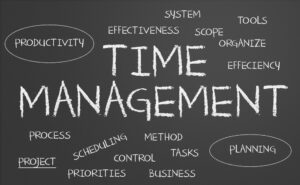Do you find that you always end up having to work extra hours to hit your deadlines?
Do you have to reschedule meetings with clients because it’s always down to the wire for one project or another?
If you answered yes to either of those, you may suffer from a common problem - poor time management. And the cure is to rethink the way you work.
Otherwise, you’re on the right track for burning out pretty quickly. If you get there, it can be hard to lift yourself back up.
Just because your schedule is jam-packed doesn’t mean that you have good time management skills. It just means that you’re extremely busy. Doing your work effectively doesn’t necessarily mean that you will be efficient. The two are quite different concepts, although many people confuse the two.
Remember - time management can be the key to your success and growth. On the other hand, poor time management has dire consequences. The choice is yours - will you join us as we explore the effects, consequences, and implications of poor time management in business and find out how to recognize and minimize its impact on YOUR business?
What is Poor Time Management?
Poor time management is the inability to utilize time effectively in order to achieve your personal and business goals. It manifests in various ways, but effective scheduling is one of the best ways to avoid poor time management altogether.
You have to constantly have a bigger picture on your mind and take control of your time. Poor time management isn’t just being late and procrastinating, it negatively affects other areas of your life. Before you know it, you’re stressed, dissatisfied, and under so much pressure. But you can change all that.
What Are the Consequences of Poor Time Management?
When you’re at work struggling to meet those deadlines and get everything done, do you ever wonder what the consequences of poor time management are?
There are personal costs to you but also larger overall costs to your entire business.
When staff miss deadlines or are not very productive, this costs the business so much money. It can also lead to losing clients and entire departments becoming less productive. Let’s see the main consequences of poor time management in general:
Lack of priorities and focus
If we had to single out the biggest time-management problem for most people; it’s their lack of priorities and focus. It's even worse when there aren't clear goals to follow. If an employee allows themselves to get distracted by numerous unimportant tasks, they can end up wasting a lot of time. For example, getting distracted by every new email or starting one task after another without finishing anything.
Most employees have more work to do than could be completed in one day or even one week so they structure their tasks in resource management software tools. If you don’t know how to effectively manage your time, you rapidly start to feel overwhelmed. If that’s happening to you, the best thing you can do is focus on the one most important task you have.
Then, you can feel like you have achieved something and met a deadline. However, you’ll most likely need to leap straight into the next crisis to meet another deadline, never having enough time to get ahead of the curve. Getting proactive about your work can greatly help you meet all your deadlines early. One great way to prioritize tasks is the Eisenhower matrix. It divides your responsibilities into 4 quadrants based on how important and urgent they are.
Sometimes the issue is that an employee won’t delegate other tasks that they really should. Managers, in particular, are often guilty of this. You must delegate when appropriate. Then you can focus on the tasks where you can add the most value. This results in higher-quality work from everyone involved.
Lack of morale and motivation

When you aren't managing your time properly, this can be highly frustrating. People tend to be aware that they are not completing work as they would like to, however, they are still unmotivated to do it.
This can have a huge effect on your emotional and mental state. Low motivation and morale can become a negative cycle at work. They often result in a bad performance, and therefore low motivation, and so on. One way of altering this cycle is through the use of time management resources or training.
Negative impact on personal life
Those with poor time management are often working overtime to get work finished.
This means that they have less personal and family time, causing more stress. It can also make them more tired, lead to burnout, and even affect their health. Effective staff scheduling is extremely important to avoid burnout and overtime, while still meeting deadlines.
Missed deadlines
If you are currently exhibiting a lack of time management skills, you will likely miss deadlines. Missed deadlines are one of the most immediate consequences of poor time management. It’s simple - when you don’t plan adequately - you’re more likely to forget or push back deadlines.
This can have drastic effects on your work performance. It will also affect many of your colleagues who may suffer from the fallout.
Perhaps you are late for meetings, missed calls, or anything else that delays work getting done.
This affects much more than just you and your role. Anyone who is always unprepared can cause issues for everyone else.
It wastes the time of people who have prepared their own work. Make sure you do anything in your power not to miss deadlines. Tracking your time during work hours can help you stay on track and focus on getting things done even before deadlines.
Procrastination
Another consequence of poor time management is procrastination.
This is pretty much inevitable if you are not using your time wisely. Procrastination is when you choose to do vital work at the last minute, or even later.
This generally results in low-quality, rushed work. It also reduces your productivity and you won’t complete your tasks as well as you would have.
Consequences of Poor Time Management at Work
When team members are having problems at work caused by their poor time management skills, the whole team suffers. It inevitably causes the work-life balance of certain employees to suffer due to poor time management of their colleagues.
When this goes on for a longer period of time, it impacts the relationships and affects how the team functions. This is never truer than in the case of the manager or team leader. Some of the consequences of poor time management at work are:
Unprofessionalism
Missed deadlines show that there is a serious lack of respect and professionalism. This will surely impact the career of the person in question.
It can also act as a demotivator for the whole team because no one wants to put the work in only to fail because of someone else. This effect is even worse if the person with poor time management is their manager.
More widely, unprofessionalism can lower the excellent reputation of the business. Any client would be upset if you missed a deadline related to their project.
Lowered motivation and energy
When others feel like they can’t achieve anything because of one team member, it decreases employee morale. Dissatisfaction is at an all-time high while completion rates decrease as well. This all contributes towards lower energy levels.
When people have little energy, they often start performing worse.
The risk of this is that a manager responds by piling on the pressure to perform. However, instead of rectifying the problem, this can make it worse. It creates a stressful work environment and can lead to high turnover rates.
Budget overruns
Missed deadlines can become a huge cost for the business.
Without proper time management training, deadlines may be missed time and time again.
As an example, if you create products for a shipment leaving the next day, the shipment goes whether or not you’ve filled it up.
The cost of this can be massive. These conflicts can make your client relationships suffer and you have to lose out on profit. Projects that drag on due to poor time management and planning can also incur additional costs and eat into profits.
Stressed workplace relationships

Even just one employee with bad time management can cause client relationships to break down.
When you don’t have good time management, there is a chance that someone in another department is encountering a huge backlog due to your actions (or lack of it).
For example, one manager giving a payroll administrator the payment information at the last minute can cause the administrator a ton of stress. All because one manager failed to manage their time well.
Over time, this sort of behavior is sure to cause resentment. This can result in repeated conflicts between employees. Poor time management and stress are strongly linked. That’s why time management challenges can affect the health and emotions of employees. This could lead to further conflicts as well as low mood and lack of motivation.
Damaged Customer Relationships
One of the biggest time management problems is that when we produce low-quality work at the last minute, our clients will surely notice. They will no longer be happy with the service and may choose to go with another provider.
In fact, recent customer service statistics say that "After just one negative experience, more than half (61%) of the customers say they would move to a competitor; this number rises to 76% in the case of multiple negative experiences"
This loses the company money but also tarnishes its reputation. It’s even worse when you have contracts with the client, but it includes a service-level agreement. If you don’t meet this, you may have to pay.
What Are the Effects of Poor Time Management?
- More stress
- Less productivity
- Poor work-life balance
- Lost opportunities
- Bad decision-making
- Stalling of personal growth
- Strained relationships
Do You Manage Your Time Well? Implications of Poor Time Management
To figure out whether or not you manage your time well, you need to focus on the implications of poor time management. We’ve compiled a list of the most common ones:
Constantly feeling overwhelmed
If you constantly feel overwhelmed by the amount of work you need to complete and the number of tasks on your plate, poor time management is probably the culprit. If you also have problems with prioritizing tasks on your to-do list, it can lead to the next implication of poor time management on our list:
Procrastination
You have a lot of work to do, yet you’re still mindlessly scrolling through social media. Sounds familiar? Procrastination is putting off tasks until the last minute and it’s a classic implication of poor time management. It leads to subpar results and unnecessary stress.
Lack of planning
Poor time management isn’t just about procrastination and missed deadlines. It’s also diving into work without a clear plan and failing to set specific goals. You’re like a hamster on a wheel - constantly under pressure and working, but not achieving any results.
Inability to say no
Overcommitting and taking on more tasks than you can handle is also an implication of poor time management. Learning to say no when necessary is a crucial skill in managing your time effectively.
Neglecting personal time
If your work constantly spills over into your personal life without clear boundaries and prevents you from enjoying hobbies, relaxation, and quality time with loved ones, you definitely need to reevaluate your time management strategies.
Ending Thoughts on the Results Of Poor Time Management
We spend countless hours over our lives doing things that are of little benefit to us. If you could add this time up and see how many hours of this you waste each month, you would be shocked.
Poor time management from just one employee can create countless other conflicts in business. Lost finances, negative relationships, and missing deadlines are serious matters.
An employee with poor time management may end up losing their job. Career coaches can help with time management stress and could pull the employee out of a negative cycle.
It’s not all bad news, however!
Whether we’re talking about individuals or teams, you can resolve poor time management with fantastic software.
Manage staff schedules and time with one tool
Forget about poor time management.
You can now manage your business and grow your brand with a single, powerful software that keeps all of your appointments in line, your clients organized and your business booming.
Trafft is perfect for business owners who need to streamline their booking experience both for their staff and their clients.

Trafft handles everything for you, even sending automated email or SMS reminders to your clients. No-shows? Not anymore!
The Trafft booking software adapts to different industries for a blissful online booking experience and employee management.
Want to know more? Check out Trafft's awesome features to see what you are missing. Better yet, sign up for Trafft’s forever-free plan and experience it firsthand.
Poor Time Management FAQs
1. What are the consequences of poor time management?
Missed deadlines, elevated stress levels, lost productivity, and subpar job quality are just a few of the negative effects of poor time management. Ineffective time management can also lead to stress, procrastination, and trouble reaching both personal and professional goals. Poor time management can have a long-term detrimental impact on a person's work and personal life if it is not addressed.
2. How can I improve my time management skills?
Setting specific goals, prioritizing work, making a timetable, avoiding distractions, and monitoring progress are just a few of the techniques needed to improve time management abilities. Additionally, effective time management skills involve the ability to delegate tasks, learn to say no, and take breaks to avoid burnout. It takes time, effort, and a willingness to change one's behaviors to become more efficient to develop these talents.
3. What are some common time-wasting activities that I should avoid?
Social media browsing, intensive web browsing, television viewing, procrastination, and multitasking are examples of common time wasters. Prioritizing work, making a timetable, and establishing reasonable deadlines are crucial steps to take in order to prevent these distractions. Moreover, reducing time-wasting activities can be accomplished by taking breaks, utilizing appointment buffer time, and assigning duties to others.
4. What are some strategies for prioritizing tasks effectively?
Making a to-do list, selecting important and urgent tasks, classifying jobs according to their importance and urgency, and allotting time to do each work are all necessary for effective task prioritization. Understanding the repercussions of not completing particular duties is also crucial, as is being adaptable to changes in priorities.
5. How can I stay motivated and focused when working on tasks that are not enjoyable?
It takes a variety of techniques to stay motivated and concentrated when working on challenging projects, including segmenting the task into smaller, more manageable chunks, having a clear objective, rewarding oneself when the task is finished, and picturing the result of the task. Taking breaks, working in a quiet setting, and listening to music can all assist in improving motivation and attention.
6. What are the most effective tools or techniques for managing time?
Time management can be aided by a number of tools and methods, including making a to-do list, utilizing a planner or calendar, setting priorities, time blocking, and delegating chores. To keep track of projects and manage deadlines, time management tools and applications like Trello, Nifty, and Asana might be useful.
7. How can I balance my work and personal life when my schedule is packed?
Planning ahead and setting priorities are necessary to manage work and personal obligations. Setting limits and attainable objectives is crucial in both the workplace and in personal life. In addition, successful responsibility balancing can be achieved through delegating duties, mastering the art of saying "no," and utilizing time-blocking strategies.
8. What are some common mistakes people make when managing their time?
Time management faults include procrastinating, multitasking, neglecting to prioritize chores, not setting realistic objectives or deadlines, and failing to take breaks. Moreover, poor time management and decreased productivity might result from a failure to assign duties to others or ask for assistance when necessary.
9. How can I reduce procrastination and increase productivity?
It takes a variety of time management strategies to decrease procrastination and boost productivity, including segmenting work into smaller, easier-to-manage chunks, making a timetable, cutting out distractions, establishing clear goals, and envisioning the task's completion. Productivity can also be increased by working in a calm setting, taking breaks, and rewarding oneself when a task is finished.
10. How can I measure and track my progress in improving my time management skills?
Measuring and tracking success in time management entails creating explicit goals, identifying metrics to assess achievement, and checking progress routinely. It can also be beneficial to keep track of tasks that have been accomplished, monitor the amount of time spent on each job, and assess the efficacy of various time management strategies. Also, getting input from coworkers or a mentor can be a great way to gain understanding and point out areas that need work. Frequently monitoring progress and making adjustments to tactics can help to ensure continuing growth and improvement in time management abilities.
If you enjoyed reading this article about the effects of poor time management, you should read about why time management is important.
We also wrote about a few related subjects like time management systems, the time management matrix, using a time management coach, time management courses, time management quotes, time management strategies, techniques, and time management statistics.
Do you want an app for that? We also selected the best time management apps, but also free time management apps for tight budgets, and if you're looking for a time tracking app, we picked the best of them.
Needless to say, we are really into time management and we don't like to waste time because we know how poor time management can affect us.






